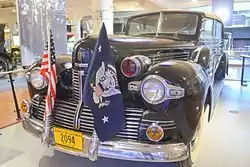
The Sunshine Special was a modified 1939 Lincoln Model K limousine that was used as the official state car by United States presidents Franklin D. Roosevelt and Harry Truman. Said to have been the "First Presidential car to acquire its own personality", and most closely associated with FDR,[1] the V12 powered four-door convertible was specifically modified for the president by coachbuilder Brunn & Company at a cost of $4,950 ($104,139 in 2022 dollars [2]) (the original cost of the car was $8,348.74 ($175,649 in 2022 dollars [2])).[3]
Initially called "Old 99," in reference to a number on its first license plate, it was later nicknamed the "Sunshine Special"[4] for its convertible roof. In spite of a previous assassination attempt on Roosevelt while riding in a Buick convertible, the president still famously enjoyed appearing in the Lincoln as an open car in parades and public gatherings.
History
Original specifications
The Sunshine Special was originally a Lincoln K-series built by the Lincoln division of Ford, and modified by Brunn & Company to U.S. government specifications. It was powered by a 150hp, 414 cubic inch V12 L-head engine. The limousine was originally equipped with a siren, running lights, and a 2-way radio, as well as extra-wide running boards and grab handles for Secret Service agents. The vehicle had a convertible roof, which gave the car its nickname. It quickly became known as a favorite of the president, who sometimes appeared before crowds without actually leaving the vehicle, allowing him to conceal that he was a polio survivor forced to use crutches and a wheelchair. There are newsreels of the time showing the car being driven on stage, such as at the podium constructed for a campaign appearance at Ebbets Field in New York in 1944, documenting the gambit.
Following Pearl Harbor
After the Japanese attack on Pearl Harbor, the Secret Service began to express concern over potential assassination attempts on the president, as his limousine at that time was not armored and had no protective features. The Secret Service did not use Al Capone's car for his visit to Congress at the United States Capitol on 8 December, in spite of the myth even being featured in the History Channel documentary Pearl Harbor: 24 Hours After.[5] [6] The Sunshine Special was modified to be capable of protecting him, with armor plating for the doors, bullet-proof tires, inch-thick windows and storage compartments for pistols and sub-machine guns. All of the safety modifications increased the car's weight to 9,300 pounds (4,218 kg). Despite these precautions, Roosevelt preferred to ride with the top down during parades and at most public gatherings. The car was also "refreshed" by being fitted with modified front end parts from the 1942 Lincoln-Zephyr.
Travels
When the president traveled the Sunshine Special, along with other Secret Service vehicles, was either driven to the president's destination if nearby or transported on a special rail car (outfitted with equipment and supplies to maintain the vehicles) if far.
Although some sources allege the Sunshine Special was transported to the wartime Tehran, Casablanca, Malta, and Yalta conferences during World War II, there appears to be no evidence to confirm this. Wartime censorship makes these claims difficult to disprove; but while there are many photographs and newsreels of President Roosevelt riding in standard military-issue Jeeps during the aforementioned overseas trips, there are no photographs of the Sunshine Special taken on these occasions. The need to maintain secrecy about the president's travel during wartime makes it highly unlikely his special limousine would have been used overseas. And the President only attended, and appeared in public in, venues protected by military troops. The practice of transporting presidential limousines overseas did not start until peace had been restored postwar. In March 1947 Life featured a photograph of President Truman visiting the pyramids at Teotihuacan near Mexico City, appearing to be riding in the Sunshine Special.
Following Roosevelt's death
After Roosevelt’s death in 1945 the Sunshine Special remained in the White House fleet, and was used by President Truman at the Potsdam Conference in Germany that July. It was replaced when a new fleet of Lincoln limousines was acquired after the 1948 election, and is on permanent display at the Henry Ford Museum in Dearborn, Michigan.
See also
Notes
- ↑ Siuru, William D. and Stewart, Andrea. Presidential Cars and Transportation. Krause Publications, 1995, p. 36.
- 1 2 1634–1699: McCusker, J. J. (1997). How Much Is That in Real Money? A Historical Price Index for Use as a Deflator of Money Values in the Economy of the United States: Addenda et Corrigenda (PDF). American Antiquarian Society. 1700–1799: McCusker, J. J. (1992). How Much Is That in Real Money? A Historical Price Index for Use as a Deflator of Money Values in the Economy of the United States (PDF). American Antiquarian Society. 1800–present: Federal Reserve Bank of Minneapolis. "Consumer Price Index (estimate) 1800–". Retrieved May 28, 2023.
- ↑ Siuru, William D. and Stewart, Andrea. Presidential Cars and Transportation. Krause Publications, 1995, p. 37.
- ↑ Siuru, William D. and Stewart, Andrea. Presidential Cars and Transportation. Krause Publications, 1995, p. 36. The first use of the nickname is unknown, but it was most likely in a photo caption.
- ↑ History Specials, Pearl Harbor: 24 Hours After. First aired December 7, 2011.
- ↑ "FDR and Al Capone's Cadillac". My Al Capone Museum. Retrieved 7 February 2015. Images of the president between the White House and Capitol show him in a car that does not match any of Capone's known automobiles.